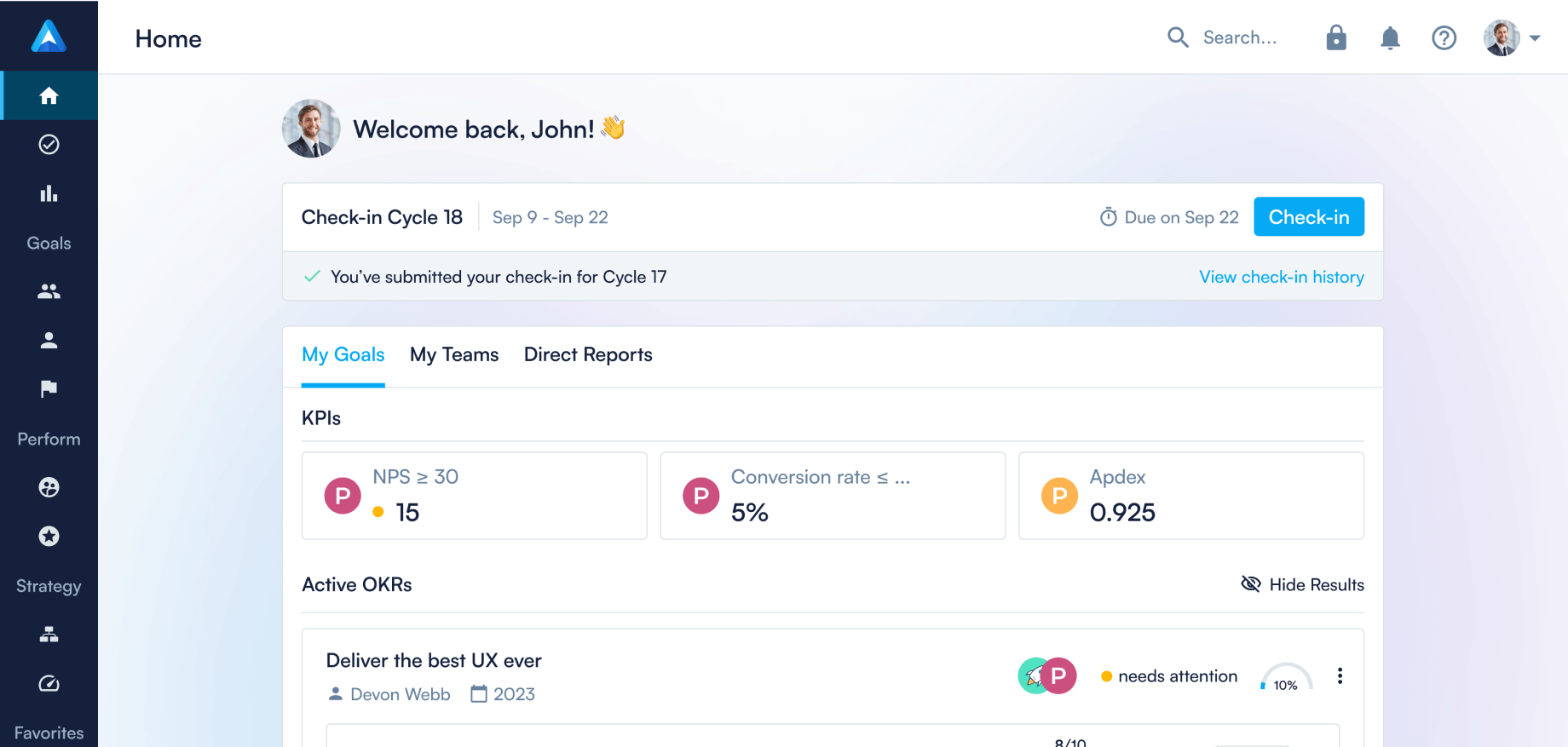
Why you should regularly update your goals

Frequently checking in to update OKRs regularly is more important than most people think. There are 3 main reasons for doing so. It helps you:
- Keep co-workers in the loop
- Boost your happiness
- Increase your success rate
1. Keep co-workers in the loop
Transparency is a key attribute of OKR. Transparency doesn’t end with defining your OKRs and sharing them with your co-workers. Sharing the steps towards an Objective or a Key Result is just as important. When you update OKRs regularly every achievement matters and it’s important to show your co-workers how you are progressing.
When people feel in the loop, you’ll find that this unleashes a constructive, positive energy in the organization. It is motivating to see yourself what other team members are up to. After all, you’re all in the same boat.
Research also found that when people feel out of the loop, they (unconsciously) interpret it as a subtle sign of rejection. As a consequence, they report reductions in trust and like their co-workers less. Very often, they also mention feeling less loyal to the organization and less motivated to perform.
Perdoo integrates with Slack, a communication tool. Once you have set up your Slack integration, Perdoo will automatically send notifications to Slack on all progress updates. Read here how to integrate Perdoo with Slack.
2. Boost your happiness
For many years, it was thought that giving employees recognition for their work was the most important contributor to an employee’s joy and motivation. Even though giving recognition is extremely important, Harvard Business School professor Teresa Amabile found that making progress is even more important.
238 employees were asked to maintain a journal about their jobs for 4 months. One of the things they were asked to do was evaluate each working day. It turned out that knowing they’d progressed towards a goal—even if it was only a small step—boosted their joy and motivation enormously. There is no easier way to do that than update OKRs regularly and share progress with your team.
You can learn more about the progress principle on Amabile’s website and her Ted Talk.
3. Increase your success rate
Research has found that monitoring progress to achieve a goal increases the likelihood that you will attain the goal. That same research also found that your chances of success are even higher when you report your progress publicly. Imagine you want to quit smoking. Telling your friends and celebrating with them after every additional week of abstinence will drastically decrease the probability of relapse.
"Monitoring goal progress is a crucial process that comes into play between setting and attaining a goal, ensuring that the goals are translated into action," says Benjamin Harkin, lead author and Ph.D. of the University of Sheffield. Harkin and his colleagues conducted a meta-analysis of 138 studies comprising in total 19,951 participants.
They found that prompting participants to monitor their progress increased the likelihood that the participants would achieve that goal. And the more frequent the monitoring, the more likely they were to succeed.
How frequent is frequent?
A best practice amongst our customers at Perdoo is to update progress on a weekly basis, although we also see many users updating progress more frequent. Perdoo also sends out a weekly report, which contains an overview of engagement and progress made by teams and individuals. By updating progress at least once a week our customers ensure that anyone receiving this email will have a good overview of where each individual, team, and the entire company stands.
This best practice is what we would recommend to every organization. Regardless of which tool or methodology you’re currently using, updating your progress on important goals and sharing it with your co-workers at least once a week will help you boost collaboration, motivation, happiness, and success across your team.
FAQ
Continue reading...


Why you shouldn’t outsource OKR to HR


How to embed goals in performance reviews






